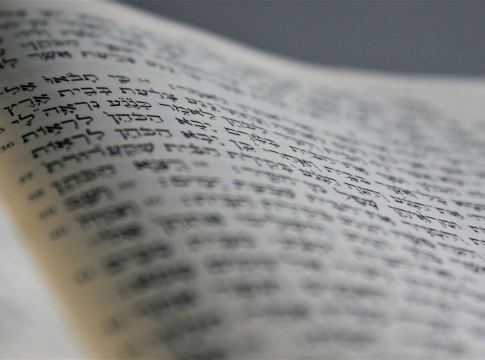
This week, we’ll look at the Hebrew word דְּר⭋ר “deror,” which means “release.” The term “deror,” which appears seven times in the Old Testament, is striking. It is especially noteworthy since Jeremiah 34 contains four instances of this word. Leviticus 25:10, Jeremiah 34:8, 15, 17 (2x), Isaiah 61:1, and Ezekiel 46:17 all include the word “deror.” The Hebrew Bible contains other terms that also refer to “freedom” in addition to the word “deror,” such as “chofshi,” which means “free, freedom.” This word also appears in the Israeli national anthem and expresses the strong desire to be “am chofshi be’artsénoe,” or “a free people in our country.”
Release of slaves
Leviticus 25:10 demonstrates how the Old Testament uses the word “deror,” which means release, to indicate that the emphasis is on the freeing of slaves. “And you shall proclaim “deror”/freedom to all the people living in the land.” The word “deror” also alludes to giving slaves their freedom when it appears in Jeremiah 34, where the prophet Jeremiah is to tell King Zedekiah what would happen to Jerusalem and to him.[1]
Isaiah 61:1 uses the term “deror” to describe the freedom of return granted to exiles. It is spoken to those who are exiled, “Return!” Isaiah proclaims “opening of prison” and “freedom to prisoners,” which are synonymous terms for people who are confined. “Deror” in Ezekiel 46:17 alludes to giving property back to its rightful owners. Here, the important thing to remember is that the owner gets his property back.
To proclaim
The word combinations that are used in relation to “deror” and “release” are significant. The word “deror” or freedom appears with the verb “to proclaim out” in each of the other six occasions, with the exception of Ezekiel 46:17. It’s a freedom that’s declared and demands extra consideration. God has given us freedom, which is a tremendous good. That needs to be declared and made very clear. Everyone needs to be aware that there is freedom, which is why “deror” or release is declared emphatically. It is, after all, a happy occasion: freedom for those who were not!
Year of jubilee
The institution of the year of jubilee, as detailed in the Old Testament (Leviticus 25:8–55), is closely linked to the declaration of “deror” or freedom. After counting seven times seven years, the so-called “year of jubilee”[2] fell in the fifty-first year (Leviticus 25:8–10). The “deror” or release was declared in that year of jubilee in favor of all slaves and unfree people, allowing everyone to go back to where they originally belonged. The Day of Atonement, which falls on the tenth day of the seventh month, marks the beginning of the Year of Jubilee (Leviticus 25:9).
With a loud blast of the shofar, or ram’s horn, everyone in the country of Israel was told, “deror,” or liberation, on that beautiful day. A powerful cry of happiness heralded the day that so many had been eagerly anticipating and yearning for—their “deror” or freedom. The shofar must have sounded glorious as that day—freedom—was declared with unfathomable joy!
Jesus’ proclamation
Luke 4:16-28 describes that unique Shabbat morning in Nazareth, where the disciples “knew Him so well,” as the setting for the Lord Jesus’ sermon. The ability to hear Jesus is amazing! As a result, people are impressed. That Shabbat’s prophetic discussion focused on Isaiah 61:1 and later[3]. Jesus reads these prophecies: “The Spirit of the Lord is upon me… It is government by God.” He has sent me to declare the year of the Lord’s favor, heal the brokenhearted, and preach release to prisoners while sharing the gospel with the impoverished.
“Today this Scripture is fulfilled in your ears,” declares Jesus, signifying that the messianic message of redemption has been fulfilled in Him (Luke 4:21). The prophecy of Isaiah regarding the salvation of “deror” and the liberation of prisoners is fulfilled in him, the Messiah. Just as the year of jubilee heralded the rescue of slaves, so Jesus heralds the year of the Lord’s favor. His “deror” (release/redemption) soothes the wounded soul. People in Nazareth desired [“miracles”] (Luke 4:23). That made them oblivious to the miracle of God’s salvation.
He offers everyone who is bound to sin salvation via His death on the cross and the opportunity to live with God as a redeemed person going forward. He declares eternal freedom, or “deror”! “You will truly be free when the Son has set you free” (John 8:36).
Notes:
[1] Compare the provisions in Exodus 21:2; Deuteronomy 15:2.
[2] The Hebrew term “jobel” is the source of the expression “year of jubilee”. The Hebrew term “jobel” originally meant “ram” (see, for example, Joshua 5:4-6). However, in the context of Leviticus 25, the word “jobel” came to imply “year of jubilee,” or the 50th year. This may have something to do with the fact that this year began with the blowing of the ram’s horn (shofar).
[3] The Prophets are included in a set portion of every section of the Torah that is read on Shabbat.
© Copyright dr. Annechiena Sneller-Vrolijk





